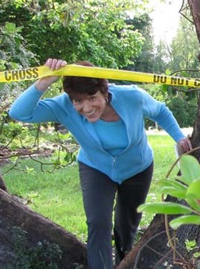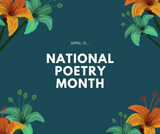 For the moment, Eugene author L.J. Sellers has tapped into the mysterious algorithms at Amazon, which has kept her Detective Jackson mystery/suspense series on the Kindle’s bestselling police procedural list for six months. This means Sellers is making money from her books, allowing her to work as, oh, rarest of rare in Writer World, a full-time novelist. Did we mention she’s self-publishing the novels? It’s a trifecta of unusual, and, even though we don’t usually like to mention the A-word here at NWBL, Sellers’ recent success provides some insights into self and e-publishing and changes in the book industry. Plus, we have to say it, there’s nothing stopping indie bookstores and their customers from buying the books the old-fashioned way.
For the moment, Eugene author L.J. Sellers has tapped into the mysterious algorithms at Amazon, which has kept her Detective Jackson mystery/suspense series on the Kindle’s bestselling police procedural list for six months. This means Sellers is making money from her books, allowing her to work as, oh, rarest of rare in Writer World, a full-time novelist. Did we mention she’s self-publishing the novels? It’s a trifecta of unusual, and, even though we don’t usually like to mention the A-word here at NWBL, Sellers’ recent success provides some insights into self and e-publishing and changes in the book industry. Plus, we have to say it, there’s nothing stopping indie bookstores and their customers from buying the books the old-fashioned way.
We asked Sellers a few questions.
I love the line from your bio: “When not plotting murders, she enjoys cycling, social networking, attending mystery conferences, performing standup comedy and hanging out with her family.” Your mysteries and thrillers take on some pretty dark stuff that I’m guessing you don’t see in your day-to-day. How did you become interested in writing thrillers and mysteries? As a reader, I’ve always loved crime fiction. I discovered Rex Stout, Lawrence Sanders and John MacDonald in high school and got hooked on mysteries, thrillers and caper stories. So as a  novelist, I write the kind of stories I like to read. After penning several standalone suspense novels, it occurred to me that my favorite authors were writing police procedural series and that I ought to give it a try. My readers seem to think that was a good idea.
novelist, I write the kind of stories I like to read. After penning several standalone suspense novels, it occurred to me that my favorite authors were writing police procedural series and that I ought to give it a try. My readers seem to think that was a good idea.
This reminds me of another seemingly non-violent Oregonian woman writing about grisly detective stuff—Chelsea Cain. Do you read her? How would you compare her work to yours? I read Heartsick and thought the writing was terrific. The premise was unique and engaging, as well. But, personally, I’m burnt out on serial killer stories and, as a general rule, don’t read them anymore. My work is similar to Cain’s in that we both have a homicide investigator as our main protagonist, but her series is much darker than mine, which is inevitable with serial killers as her focus. The antagonists in my novels are more realistic—people with deep character flaws who commit crimes out of misguided passion, desperation, greed, or fear. Still, my novels are considered gritty, and some readers have called them “dark.”
 How do you put yourself in the Law & Order mindset? And how do you make sure to get the details right? At the start of each novel, I conduct interviews with law enforcement professionals. I’ve talked with several homicide detectives, a medical examiner, a SWAT sergeant, and a crime scene technician. I meet regularly with the sergeant who supervises the violent crimes detectives in Eugene, and she gives me loads of details that I use to make my novels authentic. I’m also able to email any of the professionals I’ve met in person and ask specific questions as I’m writing. I’m lucky to have these contacts.
How do you put yourself in the Law & Order mindset? And how do you make sure to get the details right? At the start of each novel, I conduct interviews with law enforcement professionals. I’ve talked with several homicide detectives, a medical examiner, a SWAT sergeant, and a crime scene technician. I meet regularly with the sergeant who supervises the violent crimes detectives in Eugene, and she gives me loads of details that I use to make my novels authentic. I’m also able to email any of the professionals I’ve met in person and ask specific questions as I’m writing. I’m lucky to have these contacts.
Your debut was called The Sex Club. You had sent it to me, and it was sitting on top of a stack in my home office for awhile. I actually remember moving it to a less visible spot once when I had company coming over. Will you talk a little about the decision to use an edgy title? As I was writing the story, the clinic nurse character was investigating a group of young clients and referred to them as “the sex club.” Once I typed that phrase, I thought, ‘That’s it, that’s the title.’ It seemed fitting. My husband thought it was a mistake, so I tried to come up with alternatives, but nothing else seemed right.  Also, as an unknown author without the support of a big publisher, I figured a provocative title would get people’s attention. And it did. It also turned some readers away from the story. I blogged about this subject after the fact and put the question out to readers, asking if anyone had a better title, and no one has ever offered one. Readers seem split, with many loving it and others hating it. Recently, I sold the Turkish translation rights to The Sex Club, and the foreign publisher has renamed it Obsession. I’m fine with the title, but I’m not sure it works as well.
Also, as an unknown author without the support of a big publisher, I figured a provocative title would get people’s attention. And it did. It also turned some readers away from the story. I blogged about this subject after the fact and put the question out to readers, asking if anyone had a better title, and no one has ever offered one. Readers seem split, with many loving it and others hating it. Recently, I sold the Turkish translation rights to The Sex Club, and the foreign publisher has renamed it Obsession. I’m fine with the title, but I’m not sure it works as well.
Will you talk about the publishing process? How did you get your first book published and what was that like? This is such a big subject! But I’ll try to summarize. After having editors at major publishing houses rave about how they liked The Sex Club, yet not buy it, I decided to self-publish. I formed my own company and published the book in a professional, traditional way, and most people didn’t know it was self-published. For six months, I spent my evenings and weekends looking for a printer and distributor and getting the book edited, laid out and proofread. The novel was well-received in the mystery community, and then a small publisher picked up the next two books in the series.
 That was a frustrating and enlightening period for me. I discovered that my publisher was less effective than I was at everything: editing, cover design, promotion, organization and networking. It felt like two lost years, and after failing to sell the series to a bigger publisher, I considered giving it up. Yet having a traditional publisher, at least for a while, gave me a stamp of credibility as an author that ultimately boosted my career.
That was a frustrating and enlightening period for me. I discovered that my publisher was less effective than I was at everything: editing, cover design, promotion, organization and networking. It felt like two lost years, and after failing to sell the series to a bigger publisher, I considered giving it up. Yet having a traditional publisher, at least for a while, gave me a stamp of credibility as an author that ultimately boosted my career.
Last year, when I realized I could make money on my own with e-books, I rewrote two thrillers that had never sold and had them edited and formatted for Kindle. I also paid for cover design as well. It was a risk and an investment. Once they started selling, I took it a huge step further and withdrew from my small press and released all my novels as e-books and self-published trade paperbacks. I now have eight novels on the market, five Detective Jackson mysteries and three standalone thrillers. I also just released a nonfiction collection of blogs, articles and writing advice.
Today, so many authors need to double as their own marketing person. It’s such a totally different skill set from the one you need to write. What has the marketing part been like for you? I’m fortunate that I’m an extrovert and that I also spent a long career working for magazines and newspapers, so marketing comes natural to me. Yet even though I have done a lot of direct-sales efforts, such as press releases, promo flyers, and cold calls, most of the promotion I do now is indirect social networking and blogging and I enjoy it. That’s been one of the best changes in the publishing industry, the ability to promote online in an engaging and enjoyable way.
Will you talk some about approaching bookstores about carrying your book? This has been the toughest element for me. I’ve sent out thousands of promotional flyers and e-newsletters to bookstores with very little to show for it. I’ve also made personal phone calls to bookstores around the state to introduce myself and my series. But my small traditional publisher was not well known and neither was I—until early this year—so most bookstores have been reluctant to take a chance. Some independent stores, such as Murder by the Book in Portland and Seattle Mystery Bookshop, have supported me by hosting signings, and I’m grateful for that. I understand that bookstores have a limited amount of retail space and they can’t stock every author, but all my novels are available in print from Ingram, so bookstores can order them for customers.
Here’s a chance to reach hundreds of booksellers. In one line, will you tell us why they ought to give your novels a chance? Readers love my Detective Jackson series and most end up buying all five, so they’re great for bringing customers back to the store.
You’re making a living as a full-time novelist, which, you know, is a pretty rare thing and a dream for so many people. How have you been able to do that? After I got laid off from a day job, I built up my freelance editing business, but it wasn’t enough to pay the bills and my heart wasn’t in it. I wanted to be a full-time novelist, so I outlined a plan to move in that direction. The first step was to self-publish my unsold novels as e-books. Then Amazon doubled its royalty for digital books in a certain price range, and I realized I could make a living if I had the rights to my second and third Jackson stories. So I petitioned my publisher, who graciously released me from all my contracts, and I was able to get six books on the digital market in a few months. I was also writing a new Jackson story, freelance editing, working the reader forums and promoting like crazy. To a certain extent, I got lucky and my series got caught up in Amazon’s algorithm—people who bought this book also bought this book. My sales took off, and by the end of last year, I was earning enough money to quit freelancing. That was a glorious feeling, because I had been working 70–80 hours a week all year, and I didn’t want to maintain that pace. I still work 60 hours a week, but I love what I do.
So it was a combination of diligent daily promotion and a little help from Amazon. But readers also responded very favorably to my series and gave me great reviews and word-of-mouth support. Mystery magazines also gave my series rave reviews, lending credibility to my work, even though I switched to self-publishing. Getting a lot of books on the market in a short time helped too. I also promoted my books through UK book bloggers and forums, so I sell well in Europe too, which is a substantial chunk of my income.
So you’re not only a full-time novelist, you’re also a full-time publicist. What have you learned in the last year? What I’ve learned is that sales are inconsistent and being a full-time novelist is a life of uncertainty. The industry is changing so rapidly and the market is so flooded with self-published authors that even the tactics that worked for me six months ago aren’t working now. I have to be constantly on the lookout for new opportunities and venues to reach readers, and I have to write and publish at least two books a year to maintain my income. It’s challenging and occasionally exhausting, but I wouldn’t trade this life for anything.
Your nonfiction book, Write First, Clean Later, comes out this month. What advice do you have for other writers who want to write full-time? What groups or resources have been helpful to you? I’ve come to believe that most authors will be better off self-publishing their work. You not only get to keep most of the profit, you can also get your books out to readers much more quickly than if you wait for a traditional publisher. But writers also have to be prepared to spend several hours a day marketing—for as long as it takes. And to make a living, you have to have several books on the market selling well.
One organization I joined is International Thriller Writers, which provides opportunities to get my novels in front of crime fiction readers. I’m also active on Goodreads, a social networking forum that connects me with readers. Facebook and Twitter are also very useful for connecting with people online and gaining access to all kinds of blog posts with terrific information. Publetariat is one of my favorite sites for publishing information, and I also recommend joining an author group in your genre that shares marketing tips. And I can’t miss the opportunity to mention that my nonfiction book, Write First, Clean Later, is a collection of blogs I wrote about my journey to become a full-time author and is loaded with valuable information.



Excellent interview! Thanks for the valuable information.
Great useful information. Thanks.
Thanks for hosting me, Jamie. And thanks for stopping in Gary and Peg. This last year has been exciting, rewarding, and unreal!
Thanks for the interview, L.J. And for sending us some of your fans!